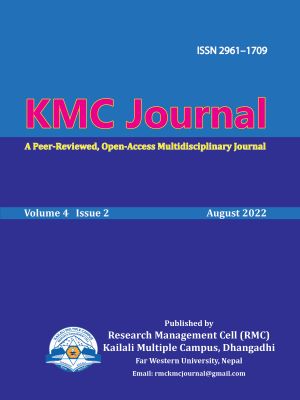Connecting Cultural Knowledge with Western-Based School Science: Experiences of Marginalized Students
DOI:
https://doi.org/10.3126/kmcj.v4i2.47747Keywords:
culturally relevant pedagogy, marginalized students, multicultural education, participatory learningAbstract
This study focuses on interactive, creative, collaborative, and inclusive science teaching environments both in school and at home to create and extend multicultural science knowledge based on the experience of culturally marginalized students toward science learning. This case study explored the knowledge construction system of students. Two culturally and economically marginalized students of a public secondary school located at Gorkha Municipality were purposively selected. To collect information in-depth interview was taken with two students jointly, and classroom teaching activities were observed and noted in the diary. The transcription of interviews and field notes taken from the classroom observation were coded, categorized and three global themes were identified. Based on global themes, the data were analyzed according to the view of participants compared to the culturally relevant pedagogy and cultural theories. The selected students were not satisfied with their teacher’s teaching strategies. The study found that culturally relevant science teaching is mainly affected by pedagogical, environmental, and strategic problems. Teachers and the school culture are seen as the main problem in implementing and braiding culturally relevant science teaching in the multicultural classroom. Science teacher is found to fail to link modern science teaching with community knowledge of culturally and economically marginalized students. Underestimating the other cultural students’ participation and teachers’ voices in science teaching is the limitation of this study.
Downloads
Downloads
Published
How to Cite
Issue
Section
License
Copyright (c) 2022 Kamal Prasad Koirala, Kharika Parajuli

This work is licensed under a Creative Commons Attribution-NonCommercial 4.0 International License.
This license allows reusers to distribute, remix, adapt, and build upon the material in any medium or format for noncommercial purposes only, and only so long as attribution is given to the creator.




